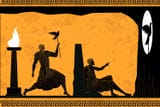>>24517589 (OP)Great questions. We should observe first that the Cave allegory doesn't by itself try to explain who they are, so it's worth wondering why the allegory plays that down.
>Are they people who escaped the cave and then came back but were threatened with death so they rejoined the system?The allegory gives us room to make at least two guesses: 1) those who, being unfettered, could now see the cave entrance, but who decided to remain for whatever reason, and 2) those who could exit the cave and decided to return. The source of the statues and implements that are shadowed by the fire necessarily have to have their cause in the latter, who made the statues and implements in imitation of things seen outside the cave.
>Is there any connection with these shadowpuppet dudes and the auxiliaries in the republic's class system?Within the Kallipolis, the auxiliaries would be believers in and defenders of the noble lies, but they wouldn't recognize them as lies. I think the noble and medicinal lies are a good sign that the city's founders (including Socrates) would be among the puppeteers. But the poets would also be included; the fact the the statues are examples of mimesis is a strong sign of that, since that's what's associated with the poets throughout the Republic.
>Why would the guardians need enforcement of their rules/ideas/whatever unless they weren't convincing enough for the lowest class?The simple but true answer would be: so the city remained just, according to how justice has been discovered, but Socrates says that the justice of the city's hierarchy is a phantom of true justice, which is in the soul (443b-444a). And I think the suggestion is that the noble lies that justify the hierarchy are going to be more securely attached to the auxiliaries and non-philosophic guardian rulers, sinve they're both selected by having stronger memories. Presumably, if the moneymakers of the lowest class start getting ideas about taking up other arts in the city beyond what they've bee assigned, the auxiliaries and guardians would think "oh, that's just how bronze souls are, they don't know better."
>Is it possible the guardians are just offering another system of shadows to people and how does the philosopher king fit into this?The guardians wouldn't be aware that they're sharing shadows to the populace, only the philosopher-kings would. The philosopher-king would love to have people to talk about the outside of the cave with, but knowing that many of the prisoners have sensitive eyes, there's a risk to freeing anyone. But this might also point to what's dangerous about philosophical pedagogy: Socrates was interested in men like Alcibiades, Critias, and Charmides on account of their willingness to question custom, but if course they pursued that to vicious or self-serving ends. Polemarchus is the ideal case (he's said in the Phaedrus to have turned to the pursuit of philosophy).

